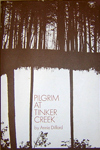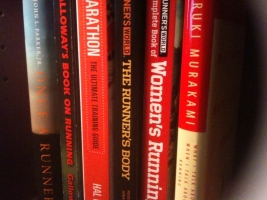Archive
Stalk Your Calling


 Who says writing is lonely work?
Who says writing is lonely work?
Today I feel the gaze of three stalwart knights looking down on me from a shelf over my desk. Three books by Annie Dillard stand as paragons of courage beckoning me to bravery. Dillard’s rank as a master essayist is certain in Pilgrim at Tinker Creek, For the Time Being, and Teaching a Stone to Talk— three of her books that inspire and daunt me at once.
They say that writers are sometimes lonely.
I say maybe we’re not lonely enough. Today I wrested sentences that jerked from my grip as I fought to bring clear thoughts to the surface. Write. Wrest. Write. Wrest. Well. It was a tough topic. Viktor Frankel-ish. Existential. The kind of stuff that’s way too deep to expose with succinct and poignant clarity. I went for a run instead.
Plodding around the reservoir I stopped in mid-stride: Dillard could write it. She already has. At home I pulled down Teaching a Stone to Talk and there it was, human conflict resolved by her so simply. In the book’s opening essay, “Living Like Weasels,” with poignant and sometimes pungent prose Dillard sums up our human dilemma: we have too many choices. We’d do better to live like a weasel and “stalk (our) calling in a certain skilled and supple way.” Such terse and sure observations fill Dillard’s pages. She uses words to unearth meaning the way an excavator uses a power shovel to crack open a creek bed. Compared to Dillard most of us are merely kicking at the dirt. My instinct in that moment was to shut the book and forget I ever knew her genius.
Who says writing is lonely work?
Today I followed a Twitter about Dillard that led me to a beautifully written homage. Alexander Chee’s personal essay, “Annie Dillard and The Writing Life” reminded me whyI kept company with Dillard in the first place–she helps me aim higher. As is true with all great writers. Listen to Chee on Dillard’s advice to her class:
If I’ve done my job, she said in the last class, you won’t be happy with anything you write for the next 10 years. It’s not because you won’t be writing well, but because I’ve raised your standards for yourself. Don’t compare yourselves to each other. Compare yourself to Colette, or Henry James, or Edith Wharton. Compare yourselves to the classics. Shoot there.
That’s when it struck me that the work of a writer is anything but lonely. Indeed.
© Shelly Roberts and Rekindledreader.com, 2009
More Poetry, Less War
If people read more poetry there’d be less war. You want audacious hope, Obama? Try suggesting NATO troops take on the Taliban with a spirited reading of Whitman’s “Song of Myself.” That’ll hit ’em square in the solar plexus in a way no arms could ever assail.
There’s a certain peace in words. They are the connective tissue that link us to one another: “for every atom belonging to me as good belongs to you,” wrote Whitman. In poetry, words alone aren’t the hook; the emotional grit of a poem is also in its structure. When Picasso said art gives form to our terrors and desires, he could have been speaking of poetry, says Edward Hirsch in How to Read a Poem. You can’t ignore a poem’s form any more than you can react to a painting without considering the colors or brush strokes on the canvas.
But you don’t have to deconstruct a poem to feel its impact. Hirsch writes that Emily Dickinson knew a poem this way: “If I read a book (and) it makes my whole body so cold no fire can ever warm me I know that is poetry. If I feel physically as if the top of my head were taken off, I know that is poetry.”
I seek that kind of visceral response from more than poetry. I look for it in fiction, too. Beyond the storyline, apart from the action, I am most transported by writing that in its very simplicity knocks me off my feet. Like this from the book on my nightstand, Jhumpa Lahiri’s Interpreter of Maladies:
More rains came. Below the dripping awning, a newspaper pressed over her head. Boori Ma squatted and watched the monsoon ants as they marched along the clothesline, carrying eggs in their mouths. Damper winds soothed her back. Her newspapers were running low.
Like the pureness in good poetry, there is a truth in Lahiri’s words that is at once unnerving and consoling. And for me, connecting with that truth, whether it’s in the cadence of a lyrical poem, or lines from a work of fiction, has a way of silencing my strife.
So while it may be a stretch to suggest that poetry can conquer a dictator or take out the Taliban, whenever my war is internal or I’m deafened by a cacophony of clashing emotions, good writing has a way of calming me. And knowing that, I offer this suggestion: if ever you find yourself “out of sorts” find a poem and a tree. Sit and read as if meditating on the words. I can’t promise anything but I have a hunch you’ll find a certain peace from it. I do.
© Shelly Roberts and Rekindledreader.com, 2009.


